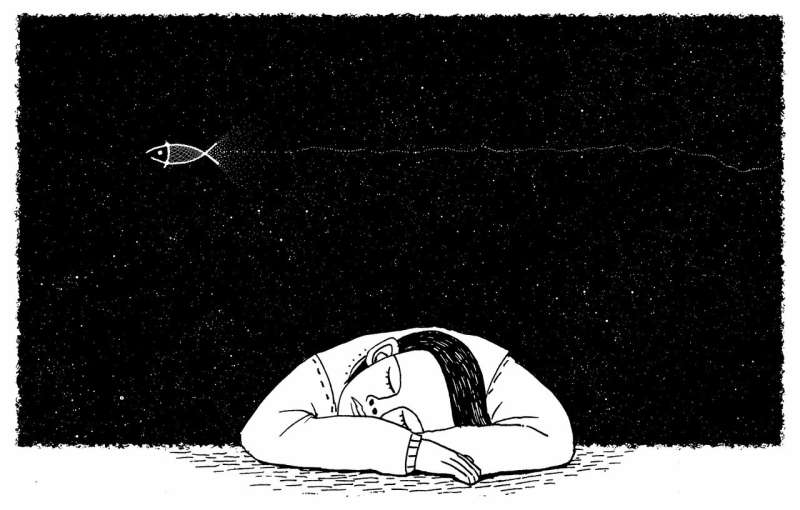This article has been reviewed according to Science X's editorial process and policies. Editors have highlighted the following attributes while ensuring the content's credibility:
fact-checked
proofread
Sleep disturbances are underappreciated in prostate cancer survivorship

We all got the memo that sleep is foundational for good health, right?
Yet, it remains easy to overlook the importance of sleep amid the challenges of managing a prostate cancer diagnosis. Even within my own self-care mantra M.E.D.S (meditation, exercise, diet, sleep) I have probably paid too little attention to its final pillar.
There are several reasons for this. Sleep is so elemental, like the air we breathe, that it's easy to overlook it while managing the more dramatic elements of prostate cancer and its treatment—the mood swings, challenges to sexuality and masculinity, incontinence issues, relationship challenges, simple survival. The good news is there is much we can do to improve our sleep.
Recent studies highlight that sleep disturbances are an underappreciated element of prostate cancer care and why it's so critical.
"Sleep deficiency is linked to chronic health problems, including heart disease, kidney disease, high blood pressure, diabetes, stroke, obesity, and depression. It is also linked to accidents that can result in injury or death," the Association of American Medical Colleges noted in a June 2023 article.
A 2022 study, "Sleep disturbances are underappreciated in prostate cancer survivorship," reported that "the prevalence of sleep disturbances among prostate cancer (PCa) survivors, and extent of urologist involvement in sleep care are not well-studied."
More than 300 PCa survivors and urologists were surveyed about sleep disturbances and survivorship care practices. Researchers found that "most PCa survivors had sleep disturbances, including 50.9% with poor sleep quality, 18.0% with clinical/severe insomnia, and 36.5% at high-risk for sleep apnea. Few urologists routinely screened for sleep disturbances, as recommended in national cancer survivorship guidelines."
Their conclusions were clear: "Optimal PCa survivorship care should incorporate screening for sleep disturbances, addressing comorbid factors affecting sleep and referring to sleep medicine when appropriate."
What makes this an even more pressing issue is that sleep disturbances and resultant quality of life concerns also plague caregivers of those with prostate cancer. In the 2022 study, Poor sleep health and quality of life among caregivers of patients with prostate cancer, researchers surveyed 81 caregivers of patients with PCa and found 77% suffered poor sleep, 22% met the criteria for clinical insomnia, and 43% used sleep medication at least once a week.
"Our results support the hypothesis that poor sleep quality is prevalent in caregivers of patients with PCa, and they may be at increased risk for undiagnosed sleep disorders such as insomnia or sleep apnea," the study notes.
"Additionally, we found that caregivers of patients with PCa had worse psychological well-being than the general population and experienced high levels of caregiver stress. This corroborates previous research showing higher rates of depression and anxiety among PCa caregivers, stemming from feelings of guilt, concerns about treatment outcomes, and financial worries. Further research is warranted to examine whether improvements in the management of sleep disorders and healthy sleep practices can enhance quality of life among cancer caregivers."
In my own experience, the MEDS self-care mantra is effective because each element supports the others. So, meditation, exercise and diet can all help promote good sleep. For me, that means if I quieten the mind with a short meditation in the evening, I enjoy much better quality of sleep. If I try and avoid eating too late into the night, abstain from coffee after midday, reduce alcohol consumption, and end the day tired and "sleep hungry" from physical exercise, all these things promote good sleep.
All the usual guidelines around good "sleep hygiene" apply, of course. Getting off tech devices a good hour before bedtime, not having a mobile phone by your bed or a TV in the bedroom, preserving your bed as a sanctuary exclusively for sleep (not working on a laptop in bed for instance).
Not becoming anxious when you are having trouble sleeping is easier said than done, but regarding it as simply a chance to rest body and mind, practicing a short meditation if unable to sleep, has become a healthy habit for me. Medicinal cannabis has also been a huge help for me. Without it, I might wake three to four times a night for a trip to the loo. With it, I might wake once or twice and occasionally sleep through.
If even the word "sleep" is loaded for you because of past issues, replace it with "rest." And if sleep issues persist, seek advice from your GP.
More information: Fred Gong et al, Sleep disturbances are underappreciated in prostate cancer survivorship, Prostate Cancer and Prostatic Diseases (2022). DOI: 10.1038/s41391-022-00630-6
Sameer Thakker et al, Poor sleep health and quality of life among caregivers of patients with prostate cancer, BJUI Compass (2022). DOI: 10.1002/bco2.157




















